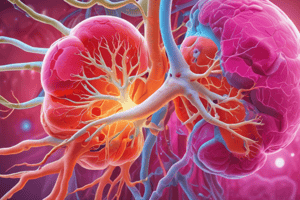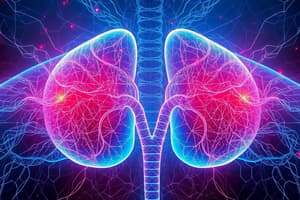Podcast
Questions and Answers
What is the primary function of aldosterone, the mineralocorticoid produced by the zona glomerulosa of the adrenal cortex?
What is the primary function of aldosterone, the mineralocorticoid produced by the zona glomerulosa of the adrenal cortex?
- To influence carbohydrate metabolism
- To generate adrenal androgens
- To maintain electrolyte and fluid balance (correct)
- To regulate immune system function
Which of the following hormones is primarily responsible for the body's stress response and inflammation regulation?
Which of the following hormones is primarily responsible for the body's stress response and inflammation regulation?
- Aldosterone
- Androstenedione
- Cortisol (correct)
- Dehydroepiandrosterone (DHEA)
Which zone of the adrenal cortex is responsible for producing the glucocorticoid hormone cortisol?
Which zone of the adrenal cortex is responsible for producing the glucocorticoid hormone cortisol?
- Zona glomerulosa
- Zona fasciculata (correct)
- Zona reticularis
- Adrenal medulla
Which disease is characterized by an overproduction of cortisol, leading to weight gain, high blood pressure, and diabetes?
Which disease is characterized by an overproduction of cortisol, leading to weight gain, high blood pressure, and diabetes?
What is the primary cause of Addison's disease?
What is the primary cause of Addison's disease?
Which of the following statements about primary adrenal insufficiency (Addison's disease) is correct?
Which of the following statements about primary adrenal insufficiency (Addison's disease) is correct?
Which zone of the adrenal cortex is responsible for generating adrenal androgens, such as dehydroepiandrosterone (DHEA) and androstenedione?
Which zone of the adrenal cortex is responsible for generating adrenal androgens, such as dehydroepiandrosterone (DHEA) and androstenedione?
Which of the following hormones is primarily involved in regulating salt and water balance in the body?
Which of the following hormones is primarily involved in regulating salt and water balance in the body?
Cushing's syndrome is characterized by which of the following symptoms?
Cushing's syndrome is characterized by which of the following symptoms?
Which laboratory test is commonly used to evaluate pituitary function in the diagnosis of adrenal disorders?
Which laboratory test is commonly used to evaluate pituitary function in the diagnosis of adrenal disorders?
Which imaging technique is commonly used to investigate structural abnormalities or tumors within the adrenal glands?
Which imaging technique is commonly used to investigate structural abnormalities or tumors within the adrenal glands?
Flashcards are hidden until you start studying
Study Notes
Adrenal Cortex Hormones and Disorders
Understanding the Adrenal Gland Cortex
The adrenal gland is a ductless endocrine organ shaped like a pyramid that sits on top of each kidney. Its structure includes the medulla, which secretes non-steroidal hormones, and the cortex, responsible for producing steroid hormones. The adrenal cortex is divided into three distinct zones: the zona glomerulosa, zona fasciculata, and zona reticularis. Each zone creates different steroid hormones:
- Zona glomerulosa: Produces aldosterone, the principal mineralocorticoid, which helps maintain electrolyte balance and blood pressure.
- Zona fasciculata: Primarily synthesizes glucocorticoids, particularly cortisol, which influences carbohydrate metabolism, protein catabolism, and immune system regulation.
- Zona reticularis: Generates adrenal androgens, such as dehydroepiandrosterone (DHEA), androstenedione, and androstenediol.
Key Hormones and Their Functions
Cortisol
Cortisol, a central player in the stress response and inflammation, helps regulate blood sugar and blood pressure, protects against immune reactions in the body, and aids in memory formation.
Aldosterone
Aldosterone plays a critical role in maintaining electrolyte and fluid balance by regulating sodium and potassium concentrations in the blood.
Common Disorders Affecting the Adrenal Cortex
Adrenal Insufficiency (Primary and Secondary)
Both primary and secondary adrenal insufficiencies occur due to reduced hormone production. Primary adrenal insufficiency, known as Addison's disease, involves damage to the adrenal glands themselves, resulting in decreased cortisol and aldosterone production. Secondary adrenal insufficiency arises when there is a problem with the pituitary gland or the hypothalamus, leading to impaired corticotropin release and consequently less hormone synthesis by the adrenal glands. Symptoms include weight loss, poor appetite, dizziness upon standing, and fatigue.
Cushing's Syndrome
This condition results from excessive exposure to cortisol, often due to prolonged administration of synthetic corticosteroids or exogenous steroid use. Patients typically display round facies, obesity, purple striae, thinning bones, muscle weakness, mental disturbance, and diabetes, though symptoms may vary.
Congenital Adrenal Hyperplasia (CAH)
CAH is a genetic disorder characterized by deficient enzymatic activity for cortisol and aldosterone synthesis, causing defects in the adrenal glands and the development of masculine features in female patients. It presents early in life with conditions such as sex reversal, ambiguous genitalia, and hypoglycemia.
Laboratory Testing for Adrenal Disorders
Diagnosis of adrenal cortex disorders often relies on laboratory tests:
- ACTH (Adrenocorticotropic hormone) assessment to evaluate pituitary function.
- Salt intake test to determine adrenal cortex responsiveness.
- High-performance liquid chromatography (HPLC) analysis to measure steroid levels such as cortisol, aldosterone, and DHEAS.
- Imaging techniques, including computed tomography (CT) scans or magnetic resonance imaging (MRI), to investigate structural abnormalities or tumors within the adrenal glands.
In summary, the adrenal gland cortex plays a vital role in maintaining body homeostasis by producing essential steroid hormones such as cortisol, aldosterone, and adrenal androgens. Various conditions, genetic factors, and environmental influences can disrupt these processes, leading to disorders such as Addison's disease, Cushing's syndrome, and congenital adrenal hyperplasia. Early diagnosis and appropriate treatment strategies are crucial for managing these complex hormonal imbalances. The advancement of molecular genetics and laboratory testing methods has improved our ability to identify underlying mechanisms and tailor therapies accordingly.
Studying That Suits You
Use AI to generate personalized quizzes and flashcards to suit your learning preferences.





